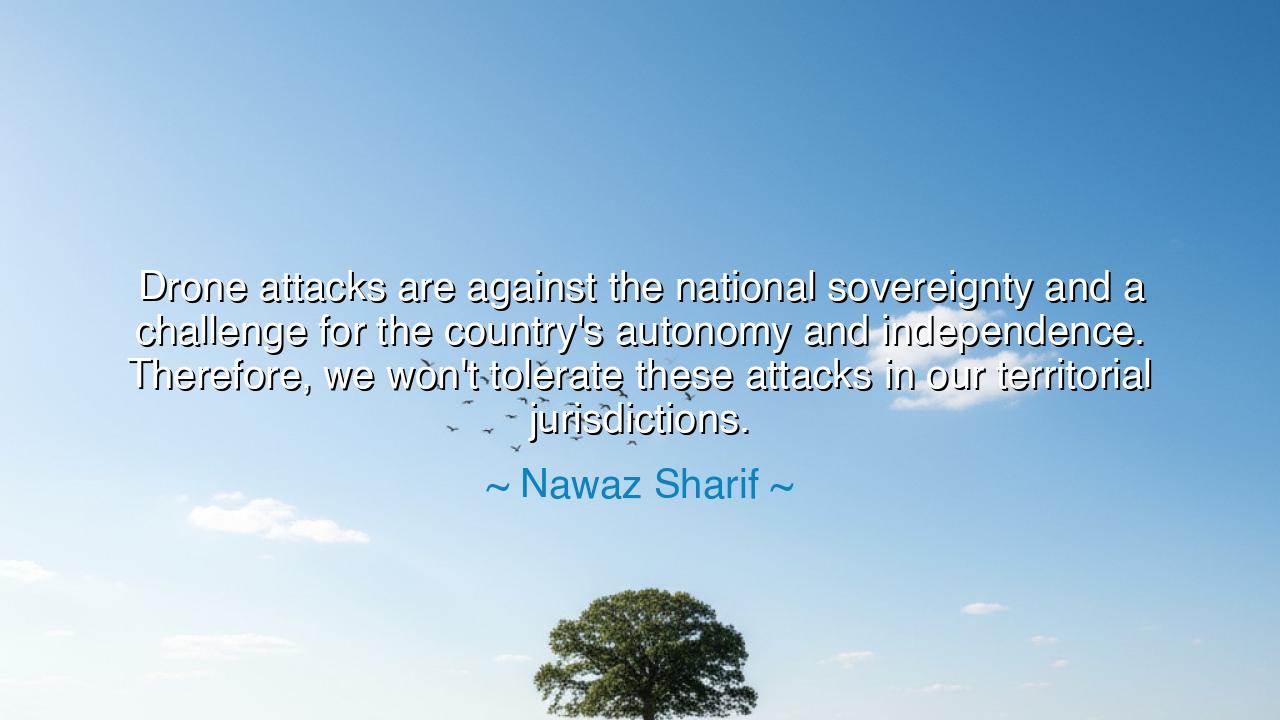
Drone attacks are against the national sovereignty and a
Drone attacks are against the national sovereignty and a challenge for the country's autonomy and independence. Therefore, we won't tolerate these attacks in our territorial jurisdictions.






“Drone attacks are against the national sovereignty and a challenge for the country’s autonomy and independence. Therefore, we won’t tolerate these attacks in our territorial jurisdictions.” Thus spoke Nawaz Sharif, the former Prime Minister of Pakistan, in a time of turbulence and wounded pride — when the skies above his nation became fields of unseen war. His words burn with the ancient fire of sovereignty, that sacred right of a people to govern their own destiny, to guard their borders not only with soldiers and stone, but with the inviolable spirit of freedom. In this declaration lies the cry of every nation that has stood beneath the shadow of foreign power and said, “This far, and no further.”
The origin of this quote lies in an era when drone warfare — weapons that strike from the heavens without warning, without presence, without accountability — had become the new face of modern conflict. Pakistan, a land both ancient and proud, found its mountains and valleys scarred by these machines. They came with the promise of precision, yet left behind the ashes of villages, the sorrow of families, and the bitter taste of violated dignity. And so, Sharif’s words were not merely political; they were spiritual — an appeal to the timeless principle that no power, however mighty, has the right to trespass upon the will of another nation without consent or justice.
To the ancients, sovereignty was not only a matter of territory, but of honor. A kingdom that could not defend its borders was said to have lost not only its land, but its soul. The wise among them taught that a nation’s independence must be guarded as a shepherd guards his flock — watchful even of the winds that blow from foreign hills. Sharif’s warning carries this same wisdom into the modern age: that when the skies are no longer safe, when machines act without the judgment of conscience, the line between security and subjugation begins to fade. Autonomy is not merely freedom from invasion; it is the right to decide one’s own fate, to keep one’s laws sacred and one’s people safe from the hands of others.
Consider the tale of Socrates, who once stood before the might of Athens and refused to flee, declaring that obedience to one’s own laws, however imperfect, was the essence of citizenship. So too does a nation, when it guards its sovereignty, declare its loyalty to itself — not to pride, but to principle. Pakistan, through Sharif’s voice, sought to remind the world that independence is not a privilege granted by the powerful, but a birthright earned by history, blood, and sacrifice. For every drone that crossed its skies was not merely a weapon; it was a symbol — a reminder that even in the age of machines, human dignity remains the first casualty of unchecked power.
And yet, Sharif’s statement carries more than anger — it carries the weight of responsibility. For autonomy, once claimed, must also be upheld by wisdom and unity. A nation that demands respect must also govern itself with justice, for tyranny within is no less a violation of sovereignty than invasion from without. The dignity of independence cannot be defended by words alone; it must be sustained by integrity, by the courage to govern wisely, and by the compassion to protect the innocent both within and beyond one’s borders.
In his words, one also hears the echo of countless nations that have suffered intrusion — the ancient cities that fell to foreign empires, the tribes who lost their lands to unseen powers, the modern states whose skies and seas became theaters of invisible war. Yet the lesson is the same: when power forgets restraint, resistance becomes virtue. To defend national sovereignty is to remind the world that no technology, no pretext of safety, can justify the erosion of human dignity.
So, my child of freedom and faith, take this wisdom to heart: sovereignty is not a relic of the past, but the foundation of peace. To honor one’s homeland is not to hate the foreigner, but to demand respect among equals. Stand firm in the defense of justice — whether for a nation or for a single soul — for the principle is the same. The skies must never belong to fear; they must belong to the free.
Let this be the lesson of Nawaz Sharif’s words: that in the age of silent drones and distant wars, the greatest weapon still lies in the heart of man — the courage to say no when power forgets its place, and to guard with unyielding faith the sacred flame of autonomy, independence, and human dignity.






AAdministratorAdministrator
Welcome, honored guests. Please leave a comment, we will respond soon